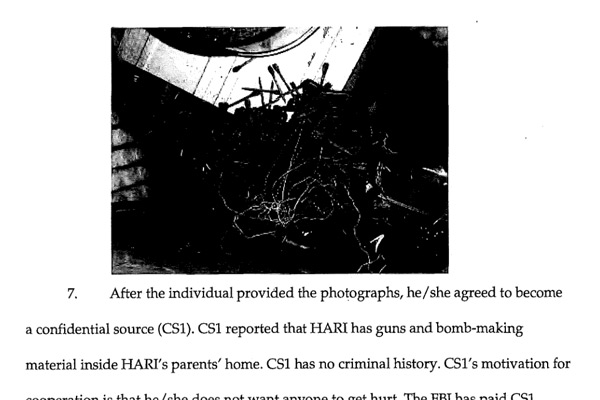Two days ago, FBI agents arrested four downstate men, between the ages of 18 and 47, for "possession of a machine gun"—specifically three fully automatic AR-15s. But the criminal complaint alleges much more: that three of the men were behind the bombing of a mosque in Bloomington, Minnesota in August 2017, and the failed bombing of a women's health clinic in Champaign in November 2017.
What broke the case, according to the complaint, was a chilling, anonymous tip—which would turn out to come from a completely unexpected source—provided last month, that led investigators to Michael Hari and Michael McWhorter of tiny Clarence, Illinois :
this is a possible terrorism threat i know a man named [J.O.] he is about 30 years old he is always talking about getting the n*****s and here lately he said he is really going to get them he has been buying a lot of wierd chemicals like nail polish remover and battery acide and i thought he was making meth because he has science things like beakers too…. so if you just blow it off like you did that school shooter kid in florida the press will know you got a tip so you better check it out just saying you did screw up once and he has a rebel flag on a pole in front of his house there is lots of them in town….
Hari had been on the FBI's radar as early as December, after an anonymous tipster gave the Ford County Sheriff's Department photos from Hari's parents' house that the individual thought was bomb-making equipment. In January, a second confidential source tied the three men to the Bloomington and Champaign incidents.
But the February tip precipitated the discovery of what's described as a pipe bomb in the complaint. Next came the discovery of the modified assault rifles that serve as the basis for the arrest. Then one of the men, Michael McWhorter, "admitted to his participation in the bombing of the Dar Al Farooq Islamic Center on August 5, 2017," as well as the failed bombing of the Champaign clinic.
McWhorter "said they did not intend to kill anyone," according to the complaint, "but they wanted to 'scare them out of the country' (referring to Muslims), because they push their beliefs on everyone else," and that "they committed the bombing mainly to 'show them hey, you're not welcome here, get the fuck out.'"
And he said that the oldest of the men, Michael Hari, was responsible for the plan.
So where did the tip come from?
According McWhorter, it was… Michael Hari.
Hari was due in court on March 13 because of an alleged assault against the "J.O." mentioned in the tip. So the tip, McWhorter told investigators, was "to get J.O. in trouble prior to the court hearings."
In other words, according to the timeline alleged in the complaint by McWhorter, Hari essentially tipped off the ATF to himself.
It's strange. But it gets even more strange, as people untangle Hari's background.
It wasn't hard to get started: Hari spoke to the Tribune's Robert Channick in April 2017 about his proposal to build a border wall for the Trump administration modeled on the Great Wall of China, and its ideological inspiration:
"We would look at the wall as not just a physical barrier to immigration but also as a symbol of the American determination to defend our culture, our language, our heritage, from any outsiders," said Hari, 46, one of a handful of Illinois applicants.
It's not an atypical belief, but Hari was an atypical person to hold it:
Hari also has spent significant time south of the border, some of it on the run during a high-profile custody dispute more than a decade ago. A member of the Old German Baptist Brethren, a denomination that favors the plain clothes of the Amish but allows for more modern amenities, Hari fled in 2005 with his teenage daughters to religious communities in Mexico and Belize over fear he would lose custody to his ex-wife.
Very atypical:
His flight became the subject of several episodes of the syndicated "Dr. Phil" TV show, which hired an investigator to locate Hari in Belize. Hari and his daughters returned to the U.S., and he was convicted of child abduction in 2006.
Hari told Channick that his own experience as an "illegal alien" gave him "compassion for people in this situation." (According to the News-Gazette's reporting at the time, the conflict with his ex-wife was over the education of his daughters and its relationship to their religious beliefs. He was eventually sentenced to 30 months probation.)
His other traces on the internet are more obscure, but extremism expert JJ MacNab has spent the past couple days unwinding what appears to be an extensive trail of his ideas and experiences. It begins with promise: he says that he was admitted to the University of Illinois at 16, earned his bachelor's at the University of Central Texas, and followed that with graduate work. But in recent years he seems to have chosen a broad range of enemies, from Bruce Rauner and Michael Madigan to the U.S. Department of Agriculture to Powerpoint to the deep state.
Again, it's a criminal complaint; what happened as described in it is far from being proven in court. But if it's close to the truth, it's stranger than fiction.




Comments are closed.